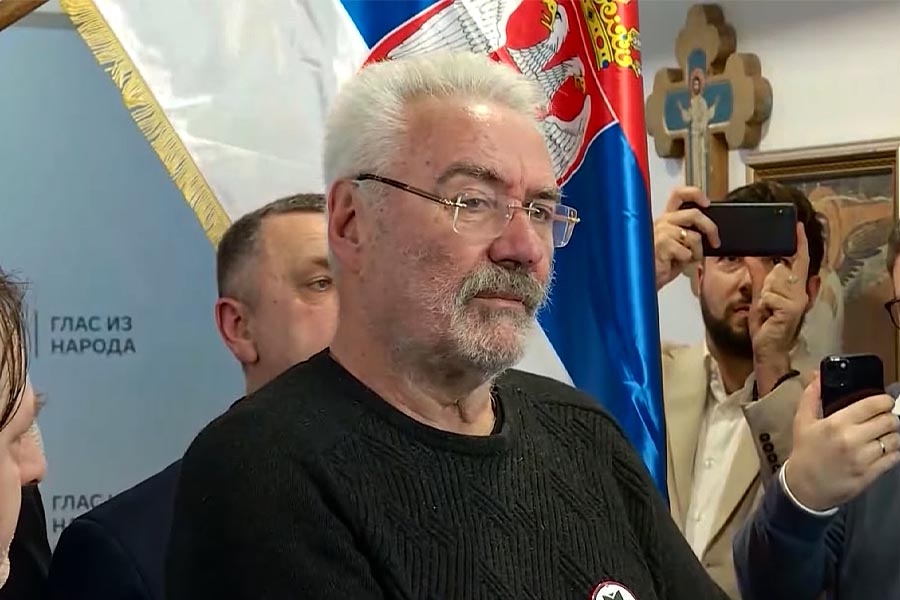Nestorovics movement is much closer to Vucic than to Nestorovic himself (some people from the electoral list “We - Voice of the people” were until recently members of the Serbian Progressive Party, and it is believed that Vucic controls the majority of future MPS and city councilors from Nestorovics list), but the people who voted for this political option are pro-opposition oriented. The situation is similar with the voters of “NADA” and “ZAVETNICI”- while their voters are against the current regime, their leaders are essentially not.
It seems that through the statements of Nestorovic himself, Vucic is offering the opposition re-elections in the capital, but as a result of the inability to form a majority in the City Assembly, and not as a result of the annulment of votes due to electoral theft of mass proportions.
Demostat, in its analyses, predicted that the SNS would win the most votes at the Republican level, while in Belgrade the majority of the votes will be won by the opposition, because in the sum of “Serbia Against Violence, NADA and “We - the Voice of the People” prevail over the Progressives and Socialists.

Nestorovics movement is much closer to Vucic than to Nestorovic himself (some people from the electoral list “We - Voice of the people” were until recently members of the Serbian Progressive Party, and it is believed that Vucic controls the majority of future MPS and city councilors from Nestorovics list), but the people who voted for this political option are pro-opposition oriented. The situation is similar with the voters of “NADA” and “ZAVETNICI”- while their voters are against the current regime, their leaders are essentially not.
It seems that through the statements of Nestorovic himself, Vucic is offering the opposition re-elections in the capital, but as a result of the inability to form a majority in the City Assembly, and not as a result of the annulment of votes due to electoral theft of mass proportions.
Demostat, in its analyses, predicted that the SNS would win the most votes at the Republican level, while in Belgrade the majority of the votes will be won by the opposition, because in the sum of “Serbia Against Violence, NADA and “We - the Voice of the People” prevail over the Progressives and Socialists.

The latest early elections in Serbia can by no means be called “fair and fair”, bearing in mind the unequal conditions for all campaign participants, as well as the numerous irregularities that were reported on the day of voting, not only in Belgrade but also throughout the country, the Demostats conclusions on the irregularity of all actions surrounding this election process are valid in case the final results remain as they are currently.
If the government, embodied in Aleksandar Vucic, does not change the position that the Sunday vote was “the cleanest and fairest so far”, it is difficult to expect that the opposition will give up the protest and be ready to recognise the results. The list "Serbia Against Violence" sent a letter to the European institutions, asking them not to recognize the results of parliamentary, provincial and especially local elections in Belgrade, until a full international investigation into electoral irregularities is completed.
On the other hand, Vucic in some way hinted that the elections for the Belgrade City Assembly could be repeated as he stated:”If Mr Nestorovic does not support anyone, we will have repeated elections in Belgrade”. It also seems that Vucic, through the statements of Nestorovic himself, is offering the opposition re-elections in the capital, but due to the inability to form a majority in the City Assembly, and not as a result of the annulment of votes due to electoral theft of mass proportions.
Nestorovics movement is much closer to Vucic than to Nestorovic himself (some people from the electoral list “We - Voice of the People” were until recently in the Serbian Progressive Party, and it is believed that Vucic controls the majority of future MPS and city councilors from Nestorovics list), but the people who voted for the said political option are opposition-oriented. The situation is similar with the voters of NADA and Zavetnici - while their voters are against the current regime, their leaders are essentially not. The so - called” Happy coalition “(after TV Happy), i.e.”We- Voice of the People“, as it is officially called, in the past year, has often been present on televisions with national frequencies, and has appeared in the show ”Aktuelnosti ", as well as in the morning and evening news programs.
One of the enigmas relates to the leader of the Novi DSS, Milos Jovanovic, who is again trying to relativise the protests in Belgrade, just as he did in May. His party, which ran again in the elections with the Movement for the Renewal of the Kingdom of Serbia (POKS), within the coalition of NADA, did not vote in Parliament to remove Bratislav Gasic from the post of Police Minister. Accidentally or intentionally, in June, Jovanovic was awarded a replica of a medieval Serbian sword by the Ministry of Defense (led by SNS leader Milos Vucevic). It is also believed that, if we do not count the lists of national minorities, the only ones who independently collected signatures for candidacy in the elections are: SNS, “Serbia Against violence” and the Socialist Party of Serbia.
While Nestorovic, without any doubt, is the biggest surprise of this election, the infamous title of the biggest losers goes to the coalition of Dveri and Zavetnici ( which remained below the census), as well as the Socialist Party of Serbia. If we add up the decline of Dveri and Zavetnici and Socialists compared to the elections held in April 2022, we get the data of nine or ten percent, which are the votes that went to the Progressives and Nestorovics movement.
Demostat, in its analyses, predicted that the SNS would win the most votes at the Republican level, while in Belgrade the majority of the votes will be won by the opposition, because in the sum "Serbia Against Violence", NADA and “We - Voice Of the People” prevail over the Progressives and Socialists.
If we take a mathematical look at the composition of the future convocation of the National Assembly, we come to the conclusion that the current ruling coalition of the SNS and the SPS, which had 151 mandates (won 56.06 percent of the votes)achieved a worse result. Namely, at the moment they appear to have 146 seats in the total (winning 52.9 percent of the votes). On the other hand, the pro-European opposition, the “Serbia Against Violence” List, received 65 mandates, which is a much better result than in 2022. This political option has about 15 more seats, if we take into account the fact that in the last elections, the Peoples Party, which had eight seats, was on the joint List.
Interestingly, many opponents of the Franco-German plan for Kosovo remained under the electoral census - Dveri and Zavetnici, the coalition of Boris Tadic and Sasa Radulovic, as well as Radicals. Numerically speaking, the new parliament will have about 10 percent of those who oppose both the aforementioned plan and Serbias membership in the EU - coalition NADA and “We - Voice of the People”, while there are over 200 MPs who advocate for Serbias European integration (SNS, “Serbia Against Violence”), and there is also the SPS, if necessary. Such a division of cards represents a novelty.
According to Demostat, the main task of the opposition, in addition to the fight for Belgrade, is to grow “Serbia Against Violence” into a political alliance at the level of the Republic, as well as in the National parliament. In this way the opposition would strengthen its positions (by synchronized work and similar moves). Otherwise, it is easy to repeat the scenario seen in 1993, that is, the case of the then New Democracy, since it is in Vucic’s interest that this coalition should disintegrate, and, if possible, that some party from that coalition should become part of the ruling majority.
The opposition must also strengthen its organisational structure by the next elections, in order to be able to cover all polling stations (with reliable controllers) in a quality manner. With all the electoral pathology, i.e. unfair conditions that reigned throughout the election campaign, it must be acknowledged that the opposition in these elections failed to secure adequate control.
In all societies there are issues that are rather being skipped. Certain...
The neoliberal path, started in 2001, has led to especially bad results in Serbi...
For centuries, the region was subsumed within the Ottoman and Hungarian Empires,...
"Serbia has returned to the systemic and anti-systemic position of the political...
In reality, Serbia is closer than ever to NATO. In the course of the last five y...